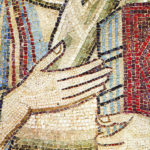We run our website the way we wished the whole internet worked: we provide high quality original content with no ads. We are funded solely by your direct support. Please consider supporting this project.

Approaches to Reading the Bible
As early as the 17th century, certain Bible scholars began to apply the scientific model of knowledge that evolved during the Scientific Revolution to the study of Scripture. This new “scientific” approach is broadly referred to as “the historical-critical method,” one that proponents claimed to be “objective.” It is rooted in the assumption that the Bible must be interpreted the same way we would interpret any other ancient book.
This method stands in contrast to the way Christian interpreters previously had read the Bible, which was shaped by the conviction that the Bible is a divinely inspired book and that it is appropriate to interpret it through the lens of the church’s rule of faith. As scholars began to view biblical interpretation as a scientific enterprise, historical-critical exegesis came to be deemed intellectually respectable precisely because it was conducted outside the authority of the Church and (allegedly) without faith presuppositions. Let’s consider some of the differences between this new historical-critical method and the more traditional method that was shaped by the Church’s rule of faith.
First, while previous interpreters had assumed that one’s ability to understand Scripture was significantly conditioned by the spiritual condition of the interpreter, this new way of studying Scripture was viewed as a strictly intellectual affair. The challenge of gaining insight into Scripture through historical-critical research was thus divorced from the challenge of becoming more Christ-like. Intellectually ascertaining historical-critical issues surrounding the original meaning of a passage was viewed as an end in-and-of itself.
The second difference pertains to the unity of the Bible. Previous interpreters had always been aware of the human quality of Scripture and of the diversity of perspectives reflected in the various books of the Bible, but their conviction regarding its single divine authorship motivated them to look for, and find, an inspired unity that integrated this diversity. As academic biblical scholarship revolted against Church authority, the motivation of looking for the divine unity of Scripture was methodologically ruled out. For instance, this new paradigm methodologically mandated that the two Testaments had to be understood in isolation from each other. But it also meant that each book, each chapter within each book, each text within each chapter, and, ultimately, each alleged source embedded within each text, had to be studied in isolation from all others.
The third difference is about the number of possible meanings of a particular passage. Pre-critical interpreters had always assumed that, because God was the ultimate author of the Bible, and because God possesses an unlimited “manifold wisdom,” any particular inspired text could have any number of different God-intended meanings. Beyond the plain sense (sensus literalis) of Scripture, it was generally agreed that Scripture embodies a fuller meaning (sensus plenoir) that could be discerned by using different interpretative strategies. We typically find interpreters throughout Church history deriving allegorical, tropological and anagogical meanings from various passages. Not only this, but Church leaders prior to the dominance of the historical-critical approach were also generally open to the Spirit speaking in new ways through Scripture to interpret and apply Scripture in ways that addressed the concerns of contemporary Christians.
With the advent of the historical-critical method, however, the only intellectually respectable meaning that could be affirmed of any given passage was its sensus literalis. The meaning of a passage became wrapped up with strategies for determining the singular meaning that it would have had to its original audience.
This is just a brief introduction to some of the differences, but it gives us enough information to see how the historical-critical method has had a rather devastating effect on the Church. To the extent that the historical-critical exegesis was deemed the only intellectually respectable way to interpret Scripture, the traditional way of reading Scripture as a single, God inspired book that contained multiple God-intended meanings, that supported the Church’s rule of faith, that bore witness to Christ, and that was intended for the spiritual transformation of God’s people was delegitimized. In addition, the fact that the historical-critical method undermined the historicity of certain biblical narratives, the consistency of its message and the unity and traditional authorship of some of its books undermined the credibility of the Gospel in the minds of many.
Over the last half century, and largely under the influence of Karl Barth, an increasing number of scholars have explored alternative ways of preserving—or better, recovering—the traditional view and use of Scripture.
To one degree or another, these scholars have generally accepted the conclusions of the historical-critical approach to Scripture. At the same time, they argue that these conclusions need not be seen as undermining the Church’s unique interpretation of Scripture as God’s Word. While it is perfectly legitimate to subject canonical works to the same critical scrutiny scholars subject other ancient works to, it is also perfectly legitimate to read Scripture with the eyes of faith and affirm it to be God’s Word. According to Barth and others who followed in his wake, there is no reason to judge the historical-critical approach to Scripture to be more “objective” or “intellectually respectable” than an approach that begins with the faith-assumption that this collection of writings is “God-breathed” for the purpose of bearing witness to Christ and transforming the people of God into his image. The criteria of objectivity that is appropriate within the Church may be vastly different from the criteria of universal reason that is allegedly aspired to within the historical-critical enterprise. But it is arrogant for any to claim that this enterprise alone has the right to call itself “objective.”
Image by Ben White via Unsplash
Category: General
Tags: Bible, Bible Interpretation
Topics: Biblical Interpretation
Related Reading

New Testament Support for the Warfare Worldview
Warfare in Jesus’ Ministry The theme of God striving to establish his sovereign will (his Kingdom) on earth over and against forces that oppose him is prevalent in the New Testament. In keeping with the apocalyptic climate of the time, there are many references to angels at war with God, demons that torment people, and…

On Biblical Interpretation
chad via Compfight Today we’re linking to a blog post from Rachel Held Evans about Biblical interpretation. In her post, Rachel writes about the complexities Christians encounter when our scriptural interpretations differ (emphasis is Rachel’s): What is perhaps most frustrating about engaging in such conversations within the evangelical community in particular, however, is that differences…

Modern Theologians and the Centrality of Christ
During the twentieth century the development of a Christocentric reading of the Scriptures—which is crucial to understanding what I argue in Crucifixion of the Warrior God—surged in the wake of Karl Barth’s publication of his Romans commentary in 1916. It was justifiably described as a “bombshell” that fell “on the playground of the theologians,” demolishing…

Is the Book of Acts Reliable?
(Note: We apologize that certain German vowels didn’t translate onto this site). Introduction The book of Acts is of critical importance in the contemporary debate about the historical Jesus. The reason for this is straightforward. Those who deny that the original, historical Jesus made divine claims for himself, performed miracles and rose from the dead…

Answering an Objection to a Cross-Centered Approach to Scripture
Through Greg’s Facebook and Twitter, we’ve been getting some great feedback and questions regarding his cross-centered approach to Scripture. Several have voiced questions similar to the reader’s (below), so we thought it would be helpful to post Greg’s answer here on his blog.

Women, Leadership, & the Bible
Neither reason nor experience supports the notion that women cannot be gifted to exercise the highest levels of spiritual authority. There is simply no rationally discernable connection between a person’s gender and their natural ability to preach, teach, or lead others. Indeed, the experience of the last 150 years has indisputably demonstrated that women can…
